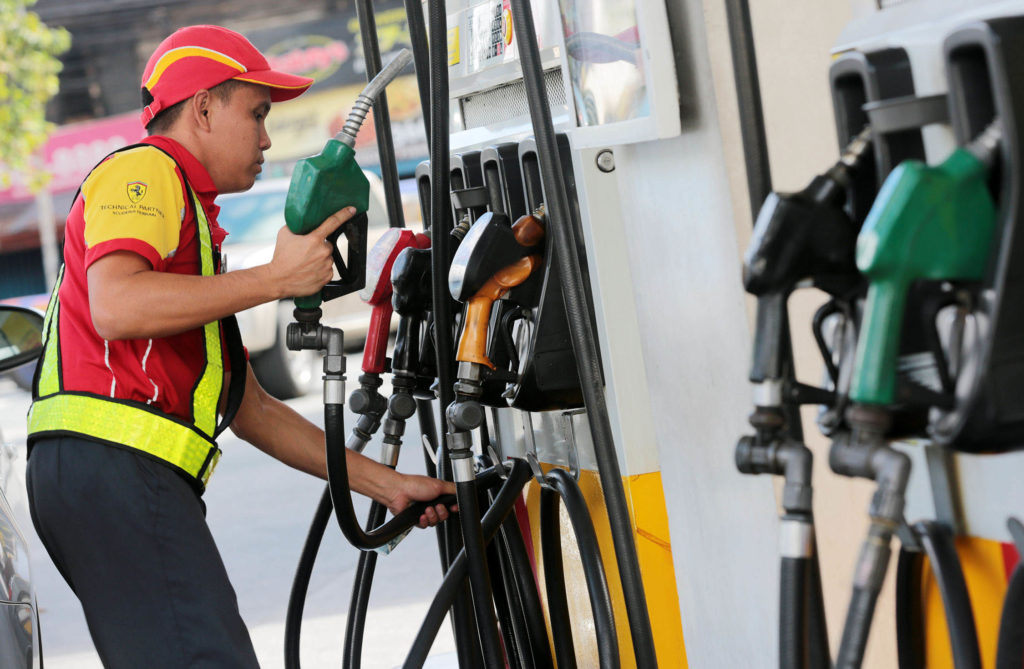Gov’t to oil firms: No price hike yet based on tax

Agas station attendant prepares to load fuel on a car in this file photo. New excise taxes on oil products intended to raise government revenues are going to increase pump prices for
gasoline and other fuels starting this year. —INQUIRER FILE PHOTO
The government on Monday warned oil companies against raising their prices by imposing the new excise tax on oil products they still have in stock from 2017, saying they could be held legally liable if they did that.
“This is because the excise is paid at the port of importation or refinery,” the Department of Finance said in a statement. “Oil [price] increase done by the companies [purportedly due to the excise tax] on Jan. 1 might be considered profiteering.”
In a separate statement, the Department of Energy (DOE) said the new excise tax rates “do NOT apply to the old stocks of petroleum products.”
Assistant Energy Secretary Leonido Pulido III said “the OIMB [Oil Industry Management Bureau] has issued an advisory to petroleum products stakeholders NOT to levy new excise tax rates on old stocks.”
The excise tax on petroleum products were included in the Tax Reform for Acceleration and Inclusion (TRAIN) measure passed by Congress last month.
Quoting Finance Secretary Sonny Dominguez, Communications Secretary Martin Andanar said in a radio interview that the increase in oil taxes was “not expected to take effect immediately on Jan. 1 because it takes a few days before the old stocks from 2017 are used up.”
“So therefore, we should be wary of people who will take advantage of this situation,” he said.
Under the TRAIN, an excise tax of P2.50 per liter would be imposed on diesel and bunker fuel starting this year. This would go up to P4.50 in 2019 and P6 in 2020.
Int’l oil prices
The excise tax on gasoline would be increased from P4.35 per liter to P7 this year and then to P9 in 2019, and P10 in 2020.
Still, two oil companies announced on Monday that they would raise pump prices on a few of their petroleum products but they cited movements in international oil prices as justification.
Starting at 6 a.m. today, diesel prices would go up by 65 centavos per liter on top of the 15-centavo increase last week. Gasoline prices would be raised by 20 centavos per liter, canceling the same amount that it had gone down last week.
Only PTT Philippines Corp. and Phoenix Petroleum Philippines Inc. have announced price hikes, although other companies are expected to follow.
Income tax
DOE data show that diesel prices in Metro Manila were in the range of P33.00 to P38.10 per liter.
Prices of gasoline with an octane rating of 95 ranged from P43.05 to P52.91 per liter.
President Duterte on Dec. 19 signed into law package 1A of the TRAIN, or Republic Act (RA) No. 10963. The law would slash and restructure personal income tax rates, which remained unchanged for the past two decades, starting on Jan. 1. The TRAIN, however, would jack up or slap new taxes on oil, cigarettes, sugary drinks and automobiles.
Bureau of Internal Revenue (BIR) chief Caesar Dulay told the Inquirer five teams at the revenue agency were working on the regulations that would serve as the implementing guidelines of the TRAIN.
In a statement late on Friday, the BIR said it was set to issue various revenue regulations on income tax, withholding tax, value-added tax (VAT) and excise taxes on petroleum, automobiles, mineral products, tobacco, sweetened beverage, cosmetic procedures as well as estate and donor’s tax, percentage tax and documentary stamp tax.
Critics
It said public consultations would be held on Jan. 11 and Jan. 12 to help guide the drafters in coming up with various issuances on the TRAIN, as well as internal briefings, which would be conducted from Jan. 24 to Jan. 26.
Andanar defended the new tax measure against government critics who had warned that it would harm the poor with the expected price increases resulting from these tax hikes.
He said the TRAIN’s “pros outweighed its cons” as it would generate more revenues for the government while providing tax breaks to ordinary employees.
“Our revenues will increase and these will go to various government projects and investments that will create jobs,” Andanar said.
He said the TRAIN also would lower the estate tax rate and cut taxes on medicines.
“Now, 99 percent of income tax payers will see that they’ll be paying less taxes. More than 70 percent of our countrymen will no longer be paying income tax because they earn less than P250,000 a year,” Andanar said.
More savings
He said those who earn P15,000 monthly will save P1,541 and those who receive P20,000 a month will see their paycheck go up by P2,683. Those with a monthly earning of P35,000 will gain P4,197 in savings, he added.
Andanar said the new revenues raised under the TRAIN would help the 10 million families who would benefit from the conditional cash transfer program this year.
“Our small and [medium] and micro entrepreneurs will also now have a simplified tax rate of eight percent on their gross sales. This will be implemented in lieu of income and percentage taxes,” he said.














